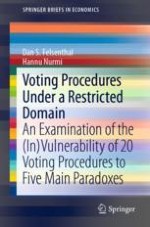2019 | OriginalPaper | Buchkapitel
3. The (In)Vulnerability of 20 Voting Procedures to Lack of Monotonicity in a Restricted Domain
verfasst von : Dan S. Felsenthal, Hannu Nurmi
Erschienen in: Voting Procedures Under a Restricted Domain
Aktivieren Sie unsere intelligente Suche, um passende Fachinhalte oder Patente zu finden.
Wählen Sie Textabschnitte aus um mit Künstlicher Intelligenz passenden Patente zu finden. powered by
Markieren Sie Textabschnitte, um KI-gestützt weitere passende Inhalte zu finden. powered by
